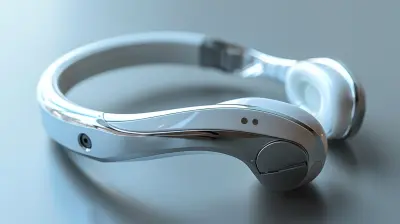How Tech is Driving the Future of Personalized Medicine
11 October 2025
Let’s be honest—healthcare often feels like a one-size-fits-all experience. You walk into a clinic, explain your symptoms, and walk out with the same meds or advice hundreds of others received that day. But here’s the thing: you’re not like everyone else. Your genetics, your environment, your lifestyle—all of that makes you uniquely you.
That’s where technology steps in. Specifically, personalized medicine is getting a tech-powered facelift, and it’s changing everything. From AI-powered diagnostics to wearable tech tracking your vitals 24/7, we’re talking about a future where treatment is tailored like a custom-made suit—not a hand-me-down from the healthcare department.
So, grab a cup of coffee, sit back, and let’s dive into how tech is not just changing, but revolutionizing personalized medicine.
What Is Personalized Medicine, Anyway?
Before we geek out on the tech, let’s clarify what personalized medicine actually means. Unlike the traditional hit-or-miss model, personalized medicine is all about precision. It involves tailoring medical treatment to the individual characteristics of each patient.Imagine going to your doctor, and instead of getting a generic treatment, you get a plan based on your genetic makeup, daily routine, and even your smartwatch data. That’s personalized medicine in a nutshell. It’s medicine made just for you.
The Role of Big Data in Personalized Healthcare
Let’s talk data. Not just any data, but big data—we’re talking about terabytes of information from electronic health records, DNA testing, wearables, and more. Technology allows us to collect, store, and analyze this data to understand individual health at a deeply granular level.Think about it: every heartbeat you track on your Fitbit, every prescription you’ve ever filled, and even your sleep patterns contribute to this massive pool of health data. With advanced analytics and machine learning, doctors and researchers can identify patterns, make predictions, and offer treatments tailored just for you.
Sounds futuristic? It’s already happening.
How does Big Data help?
- Predicts risk of disease before symptoms appear.- Identifies the most effective treatments based on your genetic profile.
- Tracks and tweaks treatment plans in real-time.

Artificial Intelligence: The Brain Behind the Operation
Let’s face it—no human can analyze millions of health records in seconds. Enter Artificial Intelligence (AI). AI algorithms can scan through truckloads of medical data and identify patterns that even the sharpest doctor might miss.Picture this: You have a rare illness. Instead of spending months on trial-and-error treatments, AI algorithms match your symptoms and genetics with others in a global database and suggest the most effective treatment—right away.
Real-World Example?
IBM’s Watson for Oncology can analyze medical literature, clinical data, and patient history to recommend treatment options. It’s like having a team of world-class doctors in your back pocket.Benefits of AI in Personalized Medicine:
- Faster diagnoses- More accurate treatments
- Early detection of potential health issues
- Continuous learning from new data

Genomics: The Blueprint for Custom Treatments
Our DNA is essentially a massive instruction manual—over 3 billion letters long. Until recently, unlocking those instructions was time-consuming and wildly expensive. But thanks to tech advances, genetic sequencing is now faster, cheaper, and more accessible than ever.With genomic data, physicians can:
- Identify the likelihood of disease
- Understand how your body responds to certain medications
- Avoid treatments that might cause adverse effects
So, instead of the usual "try this and see if it works," doctors can zero in on the medications most likely to help you based on your genetic code. That’s a game-changer.
The Rise of Wearables and Remote Monitoring
Let’s not underestimate the power of that smartwatch on your wrist. These days, wearables can monitor heart rate, oxygen levels, stress, sleep, physical activity, and even your ECG. And they do it in real-time.This constant stream of data gives doctors a dynamic view of your health over time—not just a snapshot during an office visit. And when you combine that data with AI and big data analysis, you’ve got a 360-degree view of your health.
Remote Care Just Got Smarter
Remote patient monitoring is becoming the norm, especially post-COVID. Apps and wearable-connected platforms let doctors monitor you from miles away. Think of it as your digital health assistant that never sleeps.Telemedicine—Your Doctor Is One Click Away
Telemedicine has exploded in recent years. And with that, it’s become a crucial part of delivering personalized care. Through video consultations, file sharing, and virtual monitoring, patients can receive customized advice without even leaving their couch.Got a question about your medication? Need to adjust your fitness plan based on recent symptoms? Telehealth makes that interaction seamless and fast.
It’s Not Just Convenient—It’s Transformational
- More frequent check-ins- Better follow-up on chronic conditions
- Access to specialists without long wait times
Drug Development is Getting a Tech Upgrade
Developing new drugs isn’t just expensive—it’s also hit or miss. Personalized medicine powered by tech is making this process faster and more focused.Pharmaceutical companies are using AI to design drugs that target specific genetic profiles. Clinical trials are more efficient because participants can be selected based on genetic compatibility, increasing the likelihood of success.
This means faster approvals, less money wasted, and better outcomes for patients.
Ethical Considerations and Data Privacy
Alright, now let’s address the elephant in the room: privacy. With so much sensitive health data flying around, who’s making sure it stays safe?Tech companies and healthcare providers are working on robust encryption, blockchain solutions, and stricter regulatory compliance. But it’s still a work in progress.
The ethical challenge? Balancing innovation with patient confidentiality. We need transparency, consent, and control over our own health data. Because while personalized medicine is exciting, it should never come at the cost of our privacy or autonomy.
The Human Element Still Matters
With all this tech talk, it’s easy to forget the human side of healthcare. But make no mistake—personalized medicine doesn’t replace doctors. It empowers them.Imagine your doctor being better equipped, more informed, and able to spend more time on what really matters: understanding you. Tech is the toolbox, but empathy, intuition, and human connection are still the foundation.
The Future Is Closer Than You Think
We’re not talking about sci-fi anymore. The era of personalized medicine is unfolding right before our eyes. From simple genome tests to AI-driven cancer therapies, the technology is here—and it’s only getting smarter.In the coming years, we can expect:
- Widespread genetic screening as part of routine care
- Personalized cancer vaccines
- AI chatbots triaging early symptoms
- Continuous remote monitoring for chronic illness management
Final Thoughts
So, where do you fit into all this? Right at the center. Personalized medicine is about you. Your data, your choices, your health journey.Tech is driving healthcare into the future—but not in a cold, robotic way. It’s pushing us toward a model where compassion and customization go hand in hand. It’s about making you feel seen, heard, and cared for in a way that honors your uniqueness.
And honestly? That future looks pretty amazing.
all images in this post were generated using AI tools
Category:
Tech TrendsAuthor:

Reese McQuillan
Discussion
rate this article
1 comments
Renee Hamilton
Exciting to see how tech is transforming personalized medicine! It's amazing that we're moving toward treatments tailored just for us. Can't wait to see what comes next!
October 18, 2025 at 12:23 PM

Reese McQuillan
Thank you! It's indeed an exciting time for personalized medicine, and the advancements in technology are paving the way for truly individualized treatments. Stay tuned for more innovations!


